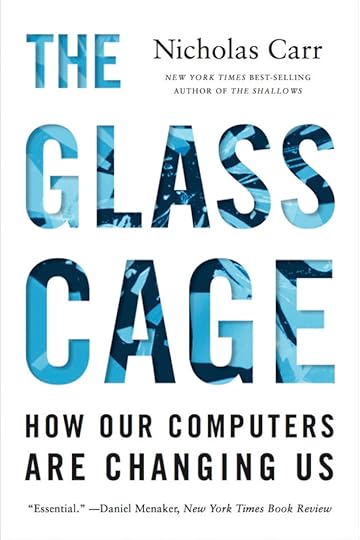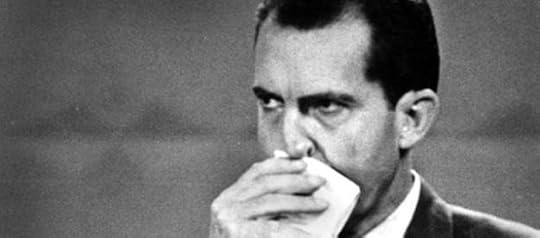Nicholas Carr's Blog, page 19
September 8, 2015
Smartness is a zero-sum game
In her article “The Internet of Way Too Many Things,” Allison Arleff reviews some of the exciting new products on display at Target’s trendy Open House store in San Francisco. There’s Leeo, a night light “that ‘listens’ for your smoke detector to go off and then calls your smartphone to let you know your house might be on fire.” There’s Whistle, a $100doggie dongle that “attaches to your pet’s collar and allows you to set a daily activity goal customized to your dog’s age, breed and weight.”...
“The Glass Cage,” now more softly covered
The paperback edition of The Glass Cage is out today, sporting a fresh new cover and subtitle:
A better mobile device has yet to be invented.
September 7, 2015
Dawn of the automatic age
It’s Labor Day, that pleasant late-summer holiday when capital eats the hamburgers that labor cooks. To mark the occasion, here’s a brief excerpt from The Glass Cage that describes the origins of automation after the Second World War:
The word automation entered the language onlyrecently. It was first utteredin 1946, when engineers at the Ford Motor Company neededa new term to describe the latest machinery being installed on the company’s assembly lines. “Give us some more of that automatic...
September 4, 2015
The Donald and The Swarm
In a tweeted response to myPolitico essay on social media’s influence on the 2016 campaign, The Atlantic‘s political editor, Yoni Appelbaum, suggests that cable TV, rather than social media, is the real driver of the Trump phenomenon.He offers a chart as backup:
Nicholas Carr argues that Trump is a product of social media. Really? Here’s cable coverage: http://t.co/5sJKGIep0M pic.twitter.com/rNOWa4X2HC
— Yoni Appelbaum (@YAppelbaum) September 4, 2015
But does this media-mentions chart actual...
September 2, 2015
The coming of the Snapchat candidate
In Western politics, we no longer get to experience the fun of a revolution, but at least we get the occasional media revolution. In an essayout todayatPolitico, I argue that we’re atthe start of the third big media makeover of modern political campaigns. First came radio in the twenties, then TV in the sixties.Now it’s social mediathat’s changing the tone and tenor of elections. The Donaldmay burn out soon, but the inability of both the press and his adversaries to make sense of the Trump c...
Donald Trump and the coming of the Snapchat candidate
In Western politics, we no longer get to experience the fun of a revolution, but at least we get the occasional media revolution. In an essayout todayatPolitico, I argue that we’re atthe start of the third big media makeover of modern political campaigns. First came radio in the twenties, then TV in the sixties.Now it’s social mediathat’s changing the tone and tenor of elections. The Donaldmay burn out soon, but the inability of both the press and his adversaries to make sense of the Trump c...
Look! It’s a Snapchat candidate!
In Western politics, we no longer get to experience the fun of a revolution, but at least we get the occasional media revolution. In an essayout todayatPolitico, I argue that we’re atthe start of the third big media makeover of modern political campaigns. First came radio in the twenties, then TV in the sixties.Now it’s social mediathat’s changing the tone and tenor of elections. The Donaldmay burn out soon, but the inability of both the press and his adversaries to make sense of the Trump c...
August 2, 2015
Logical fantasies
From Tim Hwang and Madeleine Clare Elish’s “The Mirage of the Marketplace,” in Slate:
When you open the Uber app as a rider, you see a map of your local pickup area, with little sedans around that appear to be drivers available for a request. While you might assume these reflect an accurate picture of market supply, the way drivers are configured in Uber’s marketplace can be misleading. According to Rosenblat and Stark, the presence of those virtual cars on the passenger’s screen does not nec...
July 30, 2015
The new behavioralism
We live mythically, even the most rational among us. In the middle ofa bromidic Q&A session on Facebook last month, Mark Zuckerberg fielded a question fromthe cosmologist Stephen Hawking:
I would like to know a unified theory of gravity and the other forces. Which of the big questions in science would you like to know the answer to and why?
Zuckerberg replied thathe was “most interested in questions about people,”and he gave some examples of thequestions about people that he found most inter...
July 26, 2015
The end of corporate computing (10th anniversary edition)
Last week, in its quarterly earnings report, Amazon.com revealed for the first time how much money its cloud computing operation, Amazon Web Services, takes in. The numbers were impressive. AWS has becomean $8 billion business, and its revenues continue to growswiftly, nearly doubling in the most recentquarter fromthe same period last year. The unit’s profit margin — a surprisingly robust 21 percent — is vastlywider than that of the company’s retailing operation. Indeed, without AWS, Amazon...









